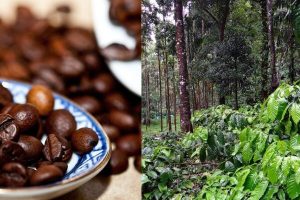Coffee has become more than just a morning pick-me-up; it has evolved into a captivating world of flavors, aromas, and brewing techniques. Within this world, specialty coffee stands out as a unique and exceptional category.
But what exactly is specialty coffee, and what sets it apart from regular coffee? In this article, we will decode the secrets of specialty coffee, exploring what makes it special and how to identify quality beans.
The Definition of Specialty Coffee: Beyond Ordinary Beans
Specialty coffee is not your average cup of joe. It represents a higher standard of coffee that is carefully cultivated, harvested, and processed to deliver exceptional taste and aroma.
The Specialty Coffee Association (SCA) defines specialty coffee as beans that score 80 points or above on a 100-point scale in a coffee grading system. These beans possess distinct qualities that make them stand out from the crowd.
The Role of Coffee Origins: Discovering Unique Terroirs
The origin of coffee plays a significant role in the specialty coffee experience. Just like wine, coffee beans take on the characteristics of their growing regions, resulting in distinctive flavors and aromas.
From the tropical hills of Ethiopia to the lush plantations of Colombia, each coffee-growing region offers a unique terroir that contributes to the overall quality and flavor profile of the beans.
The Importance of Bean Varieties: Exploring Flavor Profiles
Different coffee bean varieties, such as Arabica and Robusta, contribute to the diverse flavor profiles found in specialty coffee. Arabica beans, known for their complex flavors and acidity, are favored for their delicate and nuanced taste.
On the other hand, Robusta beans are bolder and more robust, often providing a stronger and more intense flavor. Understanding the characteristics of different bean varieties can help coffee enthusiasts identify their preferred flavor profiles.
The Art of Coffee Roasting: Transforming Beans into Flavorful Gems
Coffee roasting is a crucial step in the production of specialty coffee. It is during this process that the green coffee beans undergo transformation, developing their unique flavors and aromas. Roasters carefully monitor the roast levels to ensure optimal taste and balance.
Whether it’s a light roast with vibrant acidity or a dark roast with rich and bold flavors, the art of roasting plays a vital role
The Specialty Coffee Movement: Redefining Coffee Culture
Coffee has undergone a remarkable transformation in recent years, evolving from a simple morning beverage to a refined and artisanal experience known as specialty coffee. This movement has revolutionized how we perceive, consume, and appreciate coffee, elevating it beyond a mere caffeine fix.
In this article, we will explore the world of specialty coffee, delving into what sets it apart and how it has reshaped coffee culture.
Specialty coffee is distinguished by its meticulous cultivation, processing, and brewing methods that showcase its distinct flavors, aromas, and characteristics. It stands in stark contrast to mass-produced, generic coffee.
The rise of the specialty coffee movement was a response to the commodification of coffee, prioritizing quality, sustainability, and the craftsmanship behind coffee production.
Quality is paramount in specialty coffee. Beans are sourced from specific regions, farms, or even individual lots, where factors like growing conditions, altitude, soil composition, and varietals contribute to unique flavor profiles.
These beans undergo rigorous quality control measures to ensure that only the best make it into the hands of passionate coffee enthusiasts.
Direct trade is a key aspect of specialty coffee, fostering direct relationships between coffee farmers and roasters. By bypassing intermediaries, specialty coffee roasters establish transparent and sustainable connections with farmers, ensuring fair compensation for their labor.
This direct trade model promotes equitable distribution of profits along the coffee supply chain.
Single-origin coffees are a hallmark of specialty coffee. They are sourced from specific geographical regions or individual farms, allowing consumers to experience the unique flavors and terroir associated with those locations.
Single-origin coffees offer a deeper connection to coffee’s origins, enabling coffee lovers to explore the diverse taste profiles associated with different regions worldwide.
Artisanal roasting and brewing methods are integral to the specialty coffee experience. Artisanal roasters meticulously roast small batches of beans, carefully controlling temperature, timing, and bean development to bring out optimal flavors.
Specialty coffee enthusiasts employ various brewing methods such as pour-over, French press, or espresso, highlighting the nuanced characteristics of the beans.
Education and appreciation are fundamental to the specialty coffee movement. Coffee enthusiasts are encouraged to learn about the origins, processing methods, and flavor profiles of different coffees.
Cupping sessions, coffee tastings, and workshops are organized to deepen understanding and foster an appreciation for the complexities of specialty coffee.
The specialty coffee movement aligns with the third wave of coffee, which focuses on the artisanal aspects of coffee production and consumption. It values the entire coffee experience, from sourcing beans to brewing methods and the aesthetics of coffee shops.
Third wave coffee shops have become community spaces where baristas engage with customers, sharing their knowledge and passion for specialty coffee.
As the specialty coffee movement continues to gain momentum, it reshapes the coffee landscape and challenges traditional notions of what coffee can be. It invites us to slow down, savor each sip, and appreciate the artistry and craftsmanship behind every cup.
By embracing the specialty coffee movement, we not only enhance our coffee experiences but also support a more ethical and sustainable coffee industry. So, the next time you indulge in a meticulously brewed cup of specialty coffee, take a moment to relish the flavors and appreciate the journey that brought it to your cup.
Here’s to the specialty coffee movement and the vibrant community of coffee lovers that continue to redefine our coffee culture. Cheers!
The Specialty Coffee Roasting Process: Unlocking the Flavors and Aromas
Roasting coffee is both a science and an art. Specialty coffee roasters take great care in this process to bring out the best qualities of each coffee bean. They meticulously control factors such as temperature, time, and airflow to achieve the desired flavor profile for each coffee. It’s a delicate balance that requires expertise and precision.
Roasting coffee beans is where the magic happens. It transforms the raw, green beans into the aromatic and flavorful beans we love. Each roast level offers a different taste experience, allowing us to explore a wide range of flavors and aromas.
Light roasts are known for preserving the natural flavors and characteristics of the coffee bean. They are roasted at lower temperatures for a shorter duration, allowing the inherent flavors and subtle nuances of the origin to shine through.
Light roasts offer a vibrant and delicate drinking experience with fruity, floral, and tea-like notes.
Medium roasts strike a balance between the bean’s origin flavors and the development of rich caramelization. They exhibit a harmonious combination of acidity, sweetness, and body, making them versatile and widely appealing.
Medium roasts are a popular choice among coffee enthusiasts who seek a well-rounded and balanced cup.
For those who prefer a bolder and more robust coffee, dark roasts are the way to go. Roasted at higher temperatures and for a longer duration, dark roasts offer a fuller body and pronounced bitterness. Rich chocolate, nutty, and smoky notes dominate the flavor profile of dark roasts, creating a bold and intense coffee experience.
Specialty coffee roasters often focus on single-origin coffees, which come from a specific region or farm. These coffees allow the unique characteristics of that particular origin to shine through.
Single-origin coffees offer a deeper connection to the terroir and showcase the nuances of that specific growing region. On the other hand, blends combine different coffee beans to create a harmonious flavor profile, offering complexity and balance.
Roasters develop specific roast profiles to enhance the inherent flavors of different coffee beans. By adjusting variables such as temperature and time, they can create unique flavor profiles that accentuate specific tasting notes.
The roast profile plays a crucial role in shaping the final flavor experience, whether it’s highlighting the brightness and acidity or emphasizing the sweetness and body of the coffee.
Freshness is key when it comes to enjoying the best flavors in your cup of coffee. After roasting, coffee beans release carbon dioxide, known as degassing. Specialty coffee roasters carefully package their beans in airtight bags with one-way valves to allow the release of carbon dioxide while preventing oxygen from entering.
Proper storage in a cool, dry, and dark place helps maintain the freshness and flavor of the beans.
When evaluating the quality of coffee beans, it’s important to look beyond the roast level. Factors such as the coffee’s origin, varietal, processing method, and sourcing practices all influence the overall quality and flavor.
Specialty coffee roasters prioritize sourcing high-quality beans and work closely with farmers to ensure sustainable and ethical practices.
In conclusion, the specialty coffee roasting process is a journey of unlocking the flavors and aromas of coffee beans. Each roast level offers a unique taste experience, from the bright and delicate notes of light roasts to the bold and intense flavors of dark roasts.
By understanding the different roast levels and factors that contribute to coffee quality, we can appreciate the diversity and complexity of specialty coffee. So, go ahead and explore the world of specialty coffee, savoring each cup and discovering new flavors along the way.
The Role of Specialty Coffee in Sustainable Farming Practices
Specialty coffee goes beyond just delivering exceptional taste and quality. It also plays a significant role in promoting and supporting sustainable farming practices. Coffee farmers who engage in specialty coffee production are committed to environmental stewardship, social responsibility, and economic sustainability.
Let’s explore the ways in which specialty coffee contributes to a more sustainable coffee industry.
First and foremost, specialty coffee encourages biodiversity and conservation. Many specialty coffee farmers embrace organic and shade-grown cultivation methods, which prioritize the preservation of natural habitats and ecosystems.
By growing coffee under the shade of trees, farmers create a symbiotic relationship between coffee plants and the surrounding environment. This approach fosters biodiversity, as the shade trees provide shelter for various species of birds, insects, and other wildlife. It also helps to maintain soil health, reduce water usage, and prevent erosion.
Furthermore, specialty coffee farmers often prioritize sustainable water management practices. Water is a crucial resource in coffee production, and its conservation is vital for long-term sustainability. Farmers employ various strategies to minimize water consumption, such as efficient irrigation systems, rainwater harvesting, and water recycling techniques.
By managing water resources responsibly, specialty coffee farmers reduce their environmental impact and contribute to water conservation efforts.
In addition to environmental considerations, specialty coffee also emphasizes fair and ethical practices throughout the supply chain. This includes ensuring fair wages and safe working conditions for coffee farm workers.
Specialty coffee certification programs, such as Fair Trade and Direct Trade, establish standards that promote social equity and empower farmers. These programs enable consumers to support sustainable livelihoods for coffee farmers and contribute to the well-being of local communities.
Moreover, specialty coffee promotes quality over quantity, encouraging farmers to focus on producing smaller yields of high-quality beans rather than maximizing volume. This approach fosters a more sustainable economic model for coffee farmers.
By cultivating and selling specialty coffee, farmers can command higher prices for their premium products. This, in turn, provides them with the financial stability to invest in their farms, improve their production processes, and support their communities.
Sustainable economic practices help coffee farmers break free from the cycle of poverty and create a more resilient coffee industry.
Lastly, specialty coffee encourages transparency and traceability. Through initiatives like single-origin labeling and direct trade relationships, consumers can trace the journey of their coffee beans from farm to cup.
This transparency allows for a deeper connection between coffee lovers and the farmers who grow their coffee. By understanding the origin and story behind their coffee, consumers can make informed choices and support the farmers who practice sustainable methods.
In conclusion
specialty coffee is not just about a superior taste and experience; it represents a commitment to sustainability, environmental stewardship, social responsibility, and economic viability.
The specialty coffee industry has paved the way for a more conscious and ethical approach to coffee production, benefiting farmers, consumers, and the planet as a whole.
Through its emphasis on quality, traceability, and fair trade practices, specialty coffee has created a ripple effect of positive change in the coffee industry. Coffee farmers who embrace specialty coffee cultivation methods are not only producing exceptional beans but also actively participating in the preservation of biodiversity, conservation of resources, and the empowerment of local communities.
The importance of biodiversity and conservation cannot be overstated. Specialty coffee farmers who opt for shade-grown and organic cultivation methods provide habitats for diverse species, contribute to soil health, reduce water usage, and prevent soil erosion. This commitment to environmental stewardship ensures that future generations can continue to enjoy the rich biodiversity of coffee-growing regions.
Sustainable water management is another crucial aspect of specialty coffee production. By implementing efficient irrigation systems, rainwater harvesting, and water recycling techniques, coffee farmers minimize water consumption and contribute to the preservation of this precious resource.
Sustainable water practices not only benefit the environment but also help ensure the long-term viability of coffee production in regions where water scarcity is a concern.
The social impact of specialty coffee is equally significant. Certification programs such as Fair Trade and Direct Trade ensure fair wages and safe working conditions for coffee farmers and workers. These programs empower farmers, promote social equity, and create sustainable livelihoods within coffee-growing communities.
Specialty coffee enables consumers to make conscious choices, supporting ethical practices and contributing to the well-being of those involved in the coffee supply chain.
Economically, specialty coffee provides farmers with a sustainable alternative to the commodity coffee market. By focusing on quality over quantity and commanding higher prices for their premium beans, specialty coffee farmers can invest in their farms, improve production processes, and support their local communities.
This shift towards sustainability helps break the cycle of poverty, creates resilient farming communities, and ensures the future viability of the specialty coffee industry.
Transparency and traceability are fundamental principles of the specialty coffee movement. Consumers can now trace the origin of their coffee beans, learn about the farmers behind their favorite brews, and understand the story behind each cup.
This transparency fosters a deeper connection between coffee lovers and the people who grow their coffee, enhancing the overall coffee experience and empowering consumers to make informed choices aligned with their values.
As we continue to appreciate the rich flavors and aromas of specialty coffee, let us also celebrate the positive impact it has on the environment, communities, and the future of coffee production.
By choosing specialty coffee, we actively support sustainable farming practices, encourage biodiversity conservation, promote social responsibility, and contribute to the economic well-being of coffee farmers.
So, the next time you savor that cup of specialty coffee, remember that it represents more than just a delightful taste—it is a testament to the dedication and passion of farmers, the commitment to sustainability, and the power to make a positive difference in the world, one sip at a time.
Together, let us continue to cherish and support the specialty coffee movement, ensuring a bright and sustainable future for the coffee industry and the communities it serves.
Cheers to the remarkable journey of specialty coffee and the remarkable individuals who make it possible.



